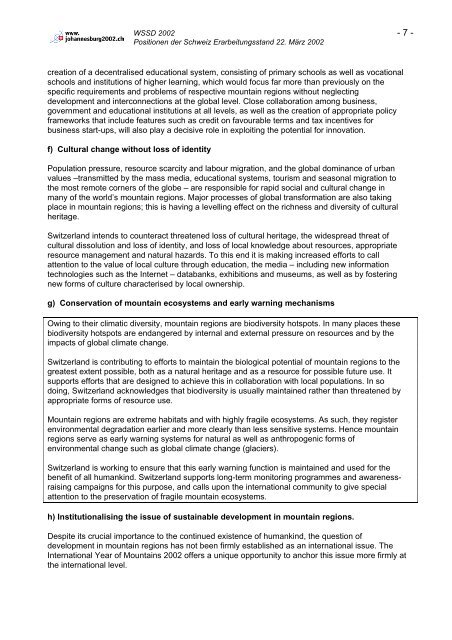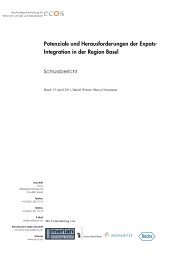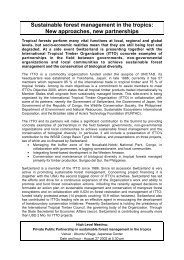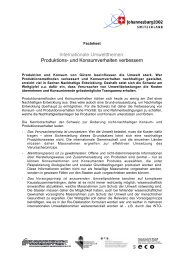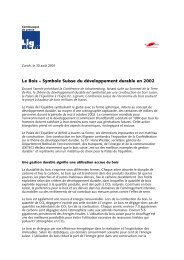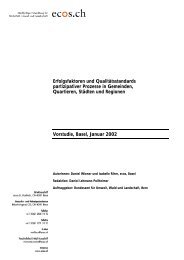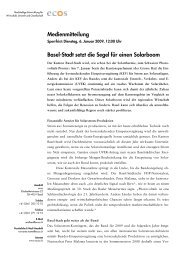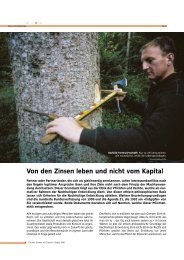Extract from the Position Paper
Extract from the Position Paper
Extract from the Position Paper
Create successful ePaper yourself
Turn your PDF publications into a flip-book with our unique Google optimized e-Paper software.
WSSD 2002 - 7 -<strong>Position</strong>en der Schweiz Erarbeitungsstand 22. März 2002creation of a decentralised educational system, consisting of primary schools as well as vocationalschools and institutions of higher learning, which would focus far more than previously on <strong>the</strong>specific requirements and problems of respective mountain regions without neglectingdevelopment and interconnections at <strong>the</strong> global level. Close collaboration among business,government and educational institutions at all levels, as well as <strong>the</strong> creation of appropriate policyframeworks that include features such as credit on favourable terms and tax incentives forbusiness start-ups, will also play a decisive role in exploiting <strong>the</strong> potential for innovation.f) Cultural change without loss of identityPopulation pressure, resource scarcity and labour migration, and <strong>the</strong> global dominance of urbanvalues –transmitted by <strong>the</strong> mass media, educational systems, tourism and seasonal migration to<strong>the</strong> most remote corners of <strong>the</strong> globe – are responsible for rapid social and cultural change inmany of <strong>the</strong> world’s mountain regions. Major processes of global transformation are also takingplace in mountain regions; this is having a levelling effect on <strong>the</strong> richness and diversity of culturalheritage.Switzerland intends to counteract threatened loss of cultural heritage, <strong>the</strong> widespread threat ofcultural dissolution and loss of identity, and loss of local knowledge about resources, appropriateresource management and natural hazards. To this end it is making increased efforts to callattention to <strong>the</strong> value of local culture through education, <strong>the</strong> media – including new informationtechnologies such as <strong>the</strong> Internet – databanks, exhibitions and museums, as well as by fosteringnew forms of culture characterised by local ownership.g) Conservation of mountain ecosystems and early warning mechanismsOwing to <strong>the</strong>ir climatic diversity, mountain regions are biodiversity hotspots. In many places <strong>the</strong>sebiodiversity hotspots are endangered by internal and external pressure on resources and by <strong>the</strong>impacts of global climate change.Switzerland is contributing to efforts to maintain <strong>the</strong> biological potential of mountain regions to <strong>the</strong>greatest extent possible, both as a natural heritage and as a resource for possible future use. Itsupports efforts that are designed to achieve this in collaboration with local populations. In sodoing, Switzerland acknowledges that biodiversity is usually maintained ra<strong>the</strong>r than threatened byappropriate forms of resource use.Mountain regions are extreme habitats and with highly fragile ecosystems. As such, <strong>the</strong>y registerenvironmental degradation earlier and more clearly than less sensitive systems. Hence mountainregions serve as early warning systems for natural as well as anthropogenic forms ofenvironmental change such as global climate change (glaciers).Switzerland is working to ensure that this early warning function is maintained and used for <strong>the</strong>benefit of all humankind. Switzerland supports long-term monitoring programmes and awarenessraisingcampaigns for this purpose, and calls upon <strong>the</strong> international community to give specialattention to <strong>the</strong> preservation of fragile mountain ecosystems.h) Institutionalising <strong>the</strong> issue of sustainable development in mountain regions.Despite its crucial importance to <strong>the</strong> continued existence of humankind, <strong>the</strong> question ofdevelopment in mountain regions has not been firmly established as an international issue. TheInternational Year of Mountains 2002 offers a unique opportunity to anchor this issue more firmly at<strong>the</strong> international level.


